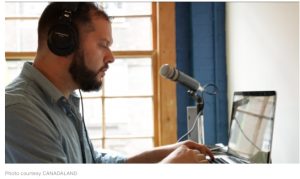Canadaland as Witness
Canadaland provides a compelling, ongoing struggle in trying to answer the question, “What do ‘journalism’ and ‘journalist’ mean in an always-on, omnipresent, citizen-journalist, participatory culture?”
Jesse Brown struggles courageously, candidly and relentlessly in pursuit of answers to this question. Because he does so publicly, he is providing us with a great opportunity for guided reflection and better understanding of the evolving media environment.
Brown is not an innocent, doe-eyed idealist—he comes to his podcasts from journalistic training and experience, having worked for Maclean’s, The Toronto Star (Gian Ghomeshi exposé) and the CBC among others—but an idealist nonetheless who believes that healthy journalism supports a healthy society. Canadaland is committed to identifying and promoting healthy journalism and identifying and calling out weak or corrupt journalism. There seems to be lots of both in Canada.
One of Canadaland’s greatest attributes is its unflagging commitment to critical thinking and to accountability. Canadaland wants us to pay “…attention to the man behind the curtain.” Brown unabashedly acknowledges that journalists construct news using an age-old set of heuristics, and he cheerfully discusses these with his guests. While ‘truth’ may be the goal, there is no illusion or delusion that bias must also be considered.
Brown approaches each topic with such an open and inquiring mind that he has put himself under the same scrutiny with which he approaches others. On one occasion he invited a Canadaland critic on to the show (Episode 58) for a respectful and reasoned discussion of Canadaland’s shortcomings. On another he invited a journalist to help him examine the sexism in a post on women staffers at the Globe and Mail (Episode 92). Treating oneself with the same critical examination as you apply to others is admirable, rare and great modeling. Treating adversaries’ ideas with respect and patience is a refreshing alternative to the virulent and ad hominem responses used by many commentators and, again, great modeling.
As Canadaland’s history unspools, it has become a mental chronicle of a committed journalist trying to understand and come to terms with the rapidly evolving roles and challenges faced by journalists and media makers. As Brown interviews both well- and lesser-known journalists, you can hear him finding new insights into the complex relationships between media, government, business, journalism and citizenship.
Because he treats each subject fearlessly and fairly, he has been sought out by those with sensitive and potentially explosive information. Paul Watson—Pulitzer-winning Toronto Star veteran reporter—candidly discussed his struggle to reveal the constructed lies surrounding political involvement in the discoveries of the Franklin Expedition ships (this article & Episode 91).
Canadaland’s contributions to media literacy are continuous and profound. It helps its listeners/readers be more aware and effective citizens. More importantly, it helps them understand and appreciate journalism’s rapid evolution. Media literacy’s greatest challenge is change. Canadaland is a lightning rod for change and Jesse Brown is a witness prodding us to continue thinking critically. As Jon Stewart urged, “If it smells bad, say something.” Brown does, and we are all beneficiaries.

 *
*



Agreed. Brown pushes the listener to think critically. How might teachers use these podcasts in the classroom (beyond conversation starters)?